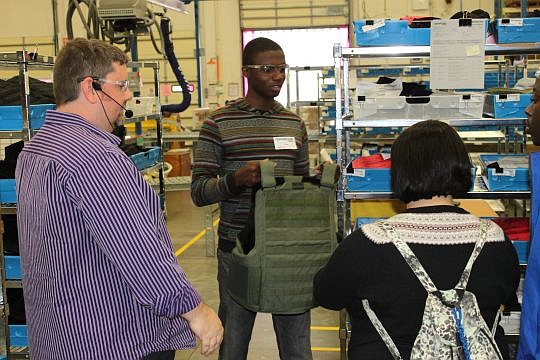
The constant beeps of forklifts filled the air as the vehicles made their way through aisles filled with goods that stretch to the ceiling.
Beep. Beep. Beep.
In the same large room, there’s interspersed whirring, banging, talking.
Each sound can be distinctly picked up if one tries. But combined, it’s harmony. The music of industry.
These notes filled the air at Safariland, maker of law enforcement and security gear. Items like body armor, helmets, shields, holsters, batons and just about anything else one can think for that industry except guns.
In the middle of a typical Friday on the floor are a dozen or so Robert E. Lee High School seniors who take part in a logistics program.
They’re on a field trip to the North Jacksonville facility to see how the industry looks and works today.
Throughout October, close to 600 students from schools in the region are taking similar tours in other local pillars of advanced manufacturing.
Caterpillar, Rayonier, Saft, Johnson & Johnson Vision Care and a dozen others.
It’s part of “Manufacturing Month,” a time when students get out of the classroom to see exactly how the businesses work.
For those in the industry, though, it’s something more. It’s a lure. A way to show the young up-and-coming workforce that manufacturing is a steady, lucrative career in an atmosphere that’s entirely different than years past. It’s not dirty or dingy. It’s air-conditioned. Organized.
“It’s not just old smokestack factories,” said state Rep. Lake Ray, president of the First Coast Manufacturers Association. “We’re well beyond that.”
Sharing that message with young people is important. Within 10 years, Ray said, about 50 percent of the manufacturing workforce will retire.
Succession planning, of sorts, has been slow — partly because students don’t think of the manufacturing industry.
For so long, children were taught that college was the only way to get a rewarding, paying career, said Ray. But that isn’t the case, he said, and college isn’t for everyone.
Ray said the manufacturer association is coming up with a plan to reach 100,000 middle school students within the next five years. That age group, he said, is more impressionable than high school students when explaining the field. Robots, large equipment and machines help in that regard.
Florida State College at Jacksonville is helping fill that training void. The community college partners with the manufacturers group when new techniques, tools and machines hit the market and, in response, develops training and courses.
Its engineering program also preps students for a mechanical aptitude test often required for machinists. In the past five years, enrollment has more than doubled.
FSCJ also provides campus tours to students to show off its manufacturing-driven work. Because when it comes to the industry, “We need people, period,” said Wendy Norfleet, FSCJ dean of career education.
The college has a partnership with Johnson & Johnson Vision Care and Englewood High School for a study-work program for the eye-care giant. Students who take part in the four-year program will spend the first couple of years in the classroom studying industry-related coursework.
Afterward, it’s on to FSCJ to complete an industry certificate. Most of the graduates are expected to be hired by the company.
The program has 212 students in it, according to Arlinda Smith, Duval County Public Schools executive director of career and technical education. It’s still new, having started only in the past couple of years.
It’s not the only manufacturing and career-driven program the system has.
A new program this year at Englewood focuses on HVAC systems, spurred by the building industry, and has 18 students in it. An automation and production program at Frank Peterson Academies has 80 students.
At Mandarin High School, an industrial and biotechnology program has 30 students. And logistics-based programs at Lee, Westside and First Coast high schools have almost 200 students combined.
Smith said such programs had “pretty much died” until superintendent Nikolai Vitti was hired and brought a more trades-focused vision.
Norfleet said she thinks efforts like tours and programs have been “a little slow” to be fully implemented, but they’re growing. And the seeing-is-believing approach will work.
“When we can touch them and make that connection, we can hook them,” she said.
It might have been the types of products Safariland produces, but there was some intrigue from the Lee students who visited.
“How long does it take?” asks one student about producing a bullet-proof chest plate. About a day at the factory.
“Is it heavy?” asks another, pointing to a large police riot shield. Yes, at 90 pounds, it’s heavy.
“What’s that smell?” It’s an autoclav, a pressure chamber used to sterilize equipment.
The most interest probably came on the forensics side of the company. With “CSI”-style crime shows popular on TV, that’s typically the case nowadays.
Asked afterward who would be interested in such a career, just one girl raised her hand.
“My dad was in manufacturing,” said Stevee Polletta, “and I’d like to follow in his footsteps.”
After she is done at the University of Florida, that is.
Another student, Chris Curry, said he’d apply to a place like Safariland.
Maybe they were just shy. About half of them on a questionnaire said they walked into the building not thinking about a job in manufacturing, but left saying it would be something they’d consider.
It’s a start.
(904) 356-2466